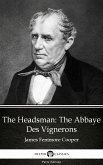This opportunity to make a political confession of faith reflected the political turn he already had taken in his fiction, having attacked European anti-republicanism in The Bravo (1831). Cooper continued this political course in The Heidenmauer (1832) and The Headsman: or the Abbaye of Vigneron (1833). The Bravo depicted Venice as a place where a ruthless oligarchy lurks behind the mask of the 'serene republic'. All were widely read on both sides of the Atlantic, though The Bravo was a critical failure in the United States.
Dieser Download kann aus rechtlichen Gründen nur mit Rechnungsadresse in A, B, BG, CY, CZ, D, DK, EW, E, FIN, F, GR, HR, H, IRL, I, LT, L, LR, M, NL, PL, P, R, S, SLO, SK ausgeliefert werden.









